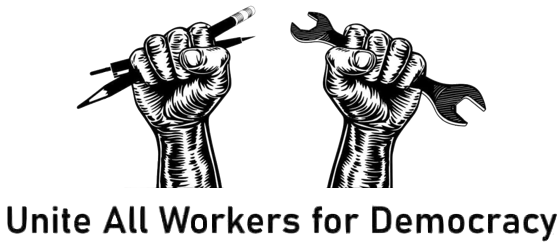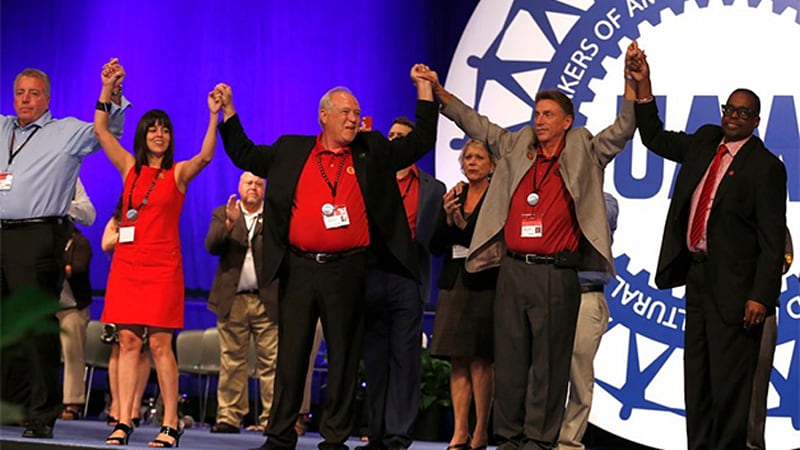Let’s talk about the dreaded “dark money” that some claim will infest every aspect of our union if we vote to move to direct elections of our International Executive Board officers.
The basic theory behind this criticism is that if we have direct elections, corporations and anti-labor groups will pour endless amounts of cash into the campaigns of their preferred candidates, and thus, those officials will be accountable to these mega donors and not the membership of our union.
First, I think it’s important to note that other unions that utilize direct elections for electing their top officers have campaign finance rules. For example, in the Teamsters only members of that union are allowed to donate to candidates’ campaigns. Any donations from corporations or employers is strictly prohibited. Even supporters of the labor movement (i.e. members of other unions, pro-labor organizations, etc) are barred from donating to the campaigns of Teamster candidates. These campaign finance rules help to ensure that all donations to candidates are strictly from members of the Teamsters. While not a fail-safe, these rules greatly deter illegal donations.
Under our current system of electing our IEB officers, delegates from UAW Locals from all across our union travel to the Convention held in Detroit every four years to elect our IEB officers. For over seventy years, delegates have repeatedly and overwhelmingly voted for candidates from one political party within our union – the Administration Caucus.
In an extensively researched article, UAW retiree and activist Thomas Adams writes that, “the Public Review Board (PRB), the UAW ethical oversight body, described the International UAW as a ‘one-party institution like many national governments in which a single political party controls the government and the officials who formally make and administer those laws are selected entirely by that party.”
This would be the equivalent of either the Republicans or Democrats holding complete control over every facet of the US government for seven decades. If that were the case, one would probably conclude that the electoral process actually wasn’t very democratic at all. Yet, this is what has occurred under the Convention delegate system — seventy years, one party rule. And since one caucus has controlled every facet of our union for so long, they are able to manipulate the outcome of our IEB elections at the Conventions using what Walter Reuther biographer Nelson Lichtenstein refers to as, “a variety of levers.”
In a Labor Notes article from January of this year, Lichtenstein described this practice:
“The UAW has been a one-party regime for many decades because the union convention, which elects all the top national officers, has been tightly controlled by an “Administration Caucus,” which routinely wins an overwhelming proportion of the delegate vote. The Administration Caucus wields a variety of levers that create loyalty among the thousand-plus convention delegates: the promise of a staff job, support in a local election, or conversely, criticism and marginalization from above. The eight UAW regional directors, also chosen at convention, are the key disciplinarians. They keep close tabs on signs of discontent among the locals and can recommend appointment to or dismissal from staff jobs.”
Added Thomas: “The Caucus controls the (union’s) agenda from local union meetings to the constitutional conventions with judicious use of parliamentary procedure. Loyal partisans pack union meetings in order to advance the party line. Insubordination is not tolerated.”
The stranglehold the Administration Caucus has had over our entire union — including the outcomes of elections at our Conventions — is why I believe the delegate system is beyond reform. Was it an effective electoral system at one time? Yes. But it has long been rendered completely ineffective under one party rule.
Perhaps the most interesting aspect of the dark money criticism of direct elections is that our delegate convention system has long been heavily influenced by a couple of legal forms of bribery; first, countless Internationally appointed jobs awarded by the Admin Caucus. These appointees are accountable only to the International, not to the membership. They can not be voted out by the rank and file. As long as they are willing to go along with the Admin Caucus’ agenda, appointees are able to keep their positions.
In an extensive In These Times article from March of 2020, former Labor Notes reporter Chris Brooks described how the Administration Caucus was able to further consolidate its control over the union via these countless appointed jobs:
“(Due to the expansion of joint programs) Union officials could now appoint Adminstration Caucus loyalists to cushy desk jobs, accelerating the growth of a large union bureaucracy and providing the Administration Caucus with an army of patronage positions to cement its power.”
The second type of dark money which has long-served to corrupt the ideology of the Caucus, are joint programs and joint funds.
What are joint programs and joint funds? Adams describes them in more detail:
“The Administration Caucus established a system of institutional corruption when they collaborated with management in 1982 to form nonprofit corporations with GM, Ford, and Chrysler to administer joint programs (jointness) created in the UAW national agreements. The Big Three automakers bankrolled the programs with “joint funds.”
The training centers transferred hundreds of millions of dollars into the UAW since 1982 but they were not clearly reported to the Department of Labor until 2005. The labor-management cooperation schemes subverted laws intended to prevent employer interference in unions. The jointness regime formed a parallel bureaucracy staffed by “joint program representatives,” appointed by the UAW President and approved by management. Joint representatives are an abundant source of employer-funded political patronage within the UAW. (Joint programs) were presented to the rank-and-file as a win-win strategy to make automakers competitive, and thereby provide job security. The outcomes of the joint labor-management cooperation schemes produced the opposite; corporate market share and employment levels plummeted.”
What stops the Caucus from offering delegates appointed positions at Solidarity House, training centers, etc, if those delegates are willing to fall in line with the Caucus’ agenda? What stops the Administration Caucus from telling Local delegates that if they don’t fall in line, perhaps their Local won’t receive the support needed to organize new members, or to win a strike, etc? This type of bribery/intimidation plays a major role in the ineffectiveness of our current system, yet it is rarely ever discussed or even mentioned by its proponents. But this manipulation of the delegate system does help explain why delegates through the decades have uniformly elected Administration Caucus candidates to the IEB over and over again and by margins that would be impossible under any process that was remotely democratic in any way.
For example, in 2018, over 99% of delegates voted for Gary Jones as our next UAW President — a man who also happened to be stealing from the union and is now serving time in prison for doing so. The previous union President, Dennis Williams, was also overwhelmingly elected by 98% of delegates in 2014, and just like Jones, he is now serving a prison sentence for corruption. Williams’ predecessor, Bob King, was elected with over 96% of the delegate vote.
Are we starting to sense a theme here?

